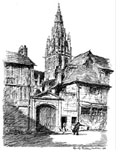
Sheldon Vanauken, R.I.P.
EDITORIAL
Sheldon Vanauken died on October 28 of cancer. His name graced our masthead since our December 1979 issue, when both he and the NOR were Anglican. For someone whose name was corrupted from van Auken to Vanauken, he was strangely Anglophilic. Though born and raised in the U.S., he insisted, for example, that labor be spelled “labour.” He loved the English tradition, especially the Church of England, and even its American transplant, the Episcopal Church. He was a high romantic, an aesthete, and a sentimentalist, and he was profoundly loyal to his friends. He wrote to your Editor, “How could a civilized person — how could a gentleman — want to be anything but Anglican?” But there was a nagging problem: Truth. He continued: “I don’t want to go [to Rome]; but I’m beginning to fear I must.” And, amazingly (for a man of his sensibility), he did — in 1981.
In 1983 the NOR followed Van to Rome, and to this day there’s been a steady stream of pilgrims making the trek to Rome. Van (as he was known to his friends) was a pioneer.
We note with gratitude that Van was absolutely loyal to the NOR. He wrote for us regularly, and even donated money. And, personally, he brought us many new subscribers. Above all, he helped lead many people, both personally and through his writings, to Christ and His Holy Roman Catholic Church.
Van’s book A Severe Mercy (HarperCollins), which celebrated his love for his young wife, “Davy,” is already a classic. When Davy died in the mid-1950s, Van was totally heartbroken, and was tempted to commit suicide. C.S. Lewis, in a letter to his friend Van (printed in A Severe Mercy), set him straight. Lewis told Van that suicide would likely not reunite Van with his beloved and saintly Davy: “You might be digging an eternally unbridgeable chasm. Disobedience is not the way to get near to the obedient.” And Van, who had wanted no children and had none, was scolded by Lewis: “You were not cutting the wood of life according to the grain…. You spared her (very wrongly) the pains of childbirth: do not evade your own, the travail you must undergo while Christ is being born in you.”
You May Also Enjoy
Penance is man’s pitiful part in cooperation with grace, an extreme method necessary to combat the difficulties posed by the passion and the pride of man.
Forty years ago, in February 1977, the first issue of the newly named New Oxford…
"Remember that Episcopal lady priest you met at the ecumenical conference?"

